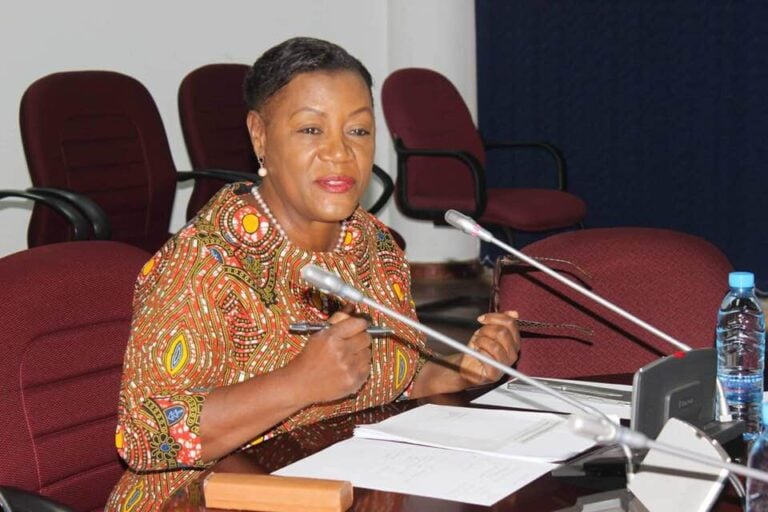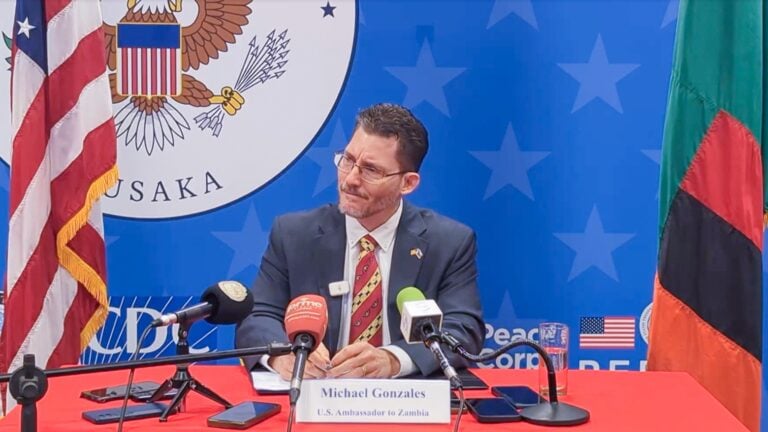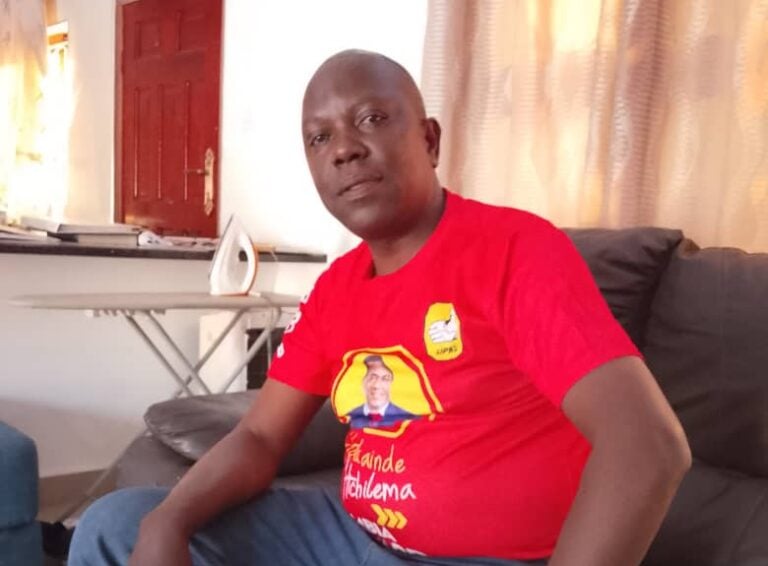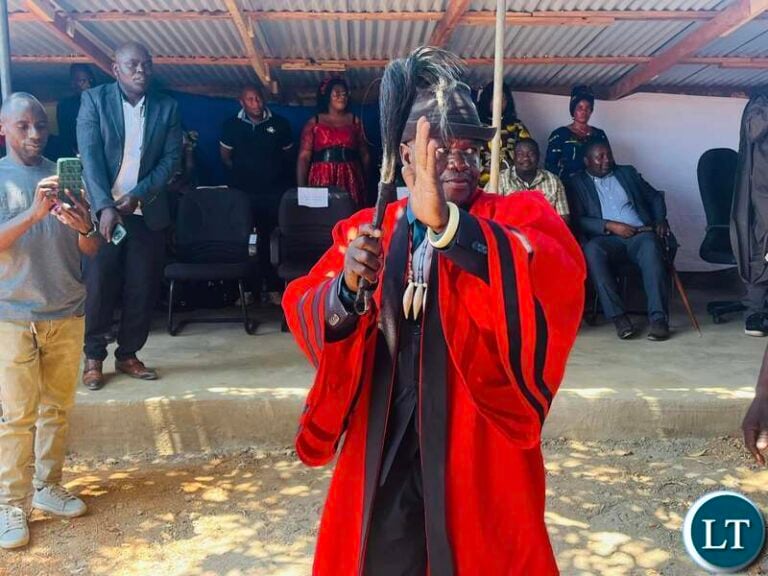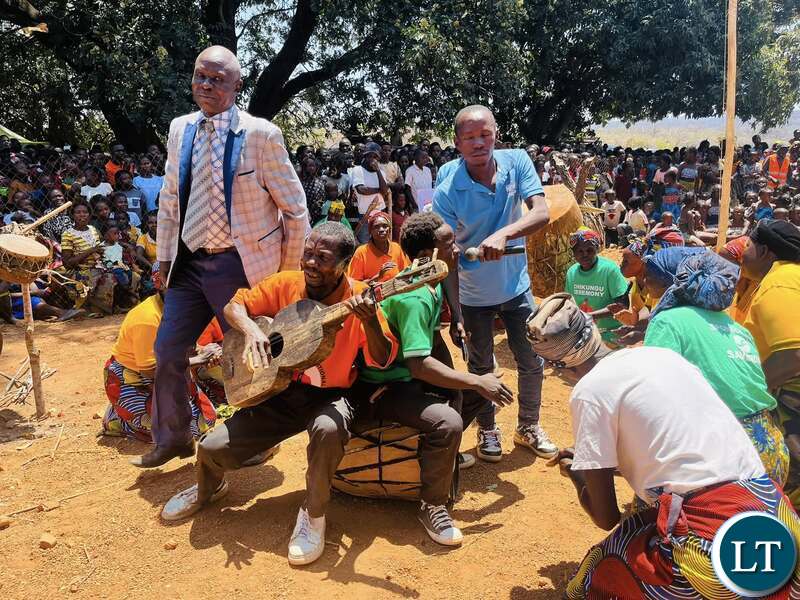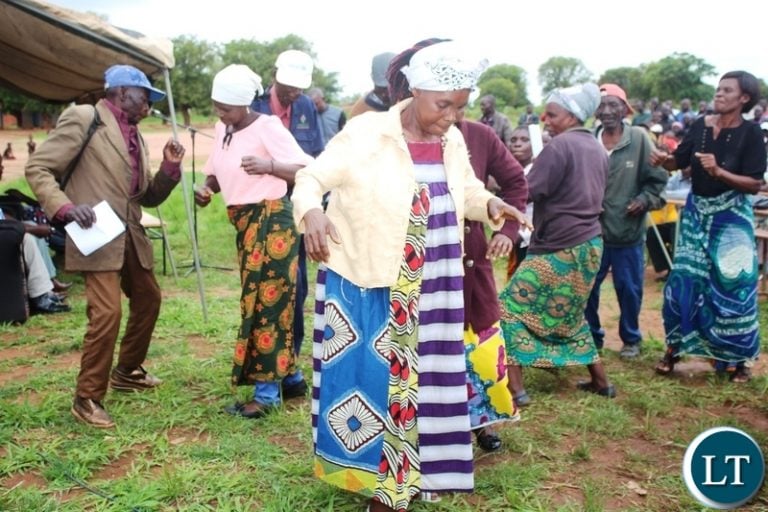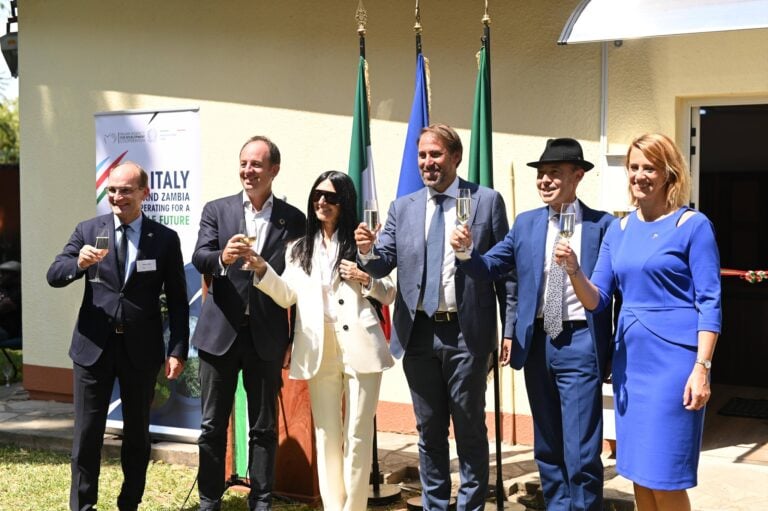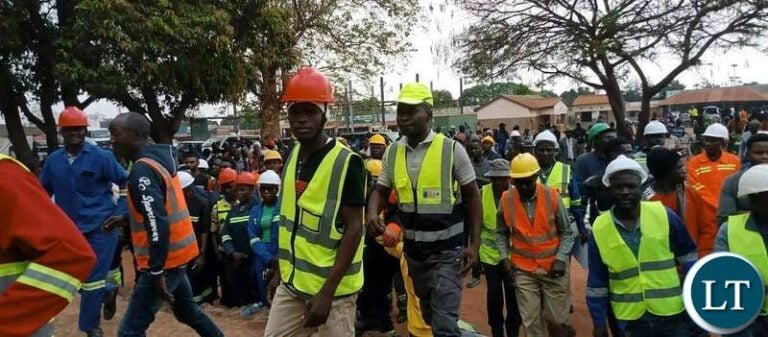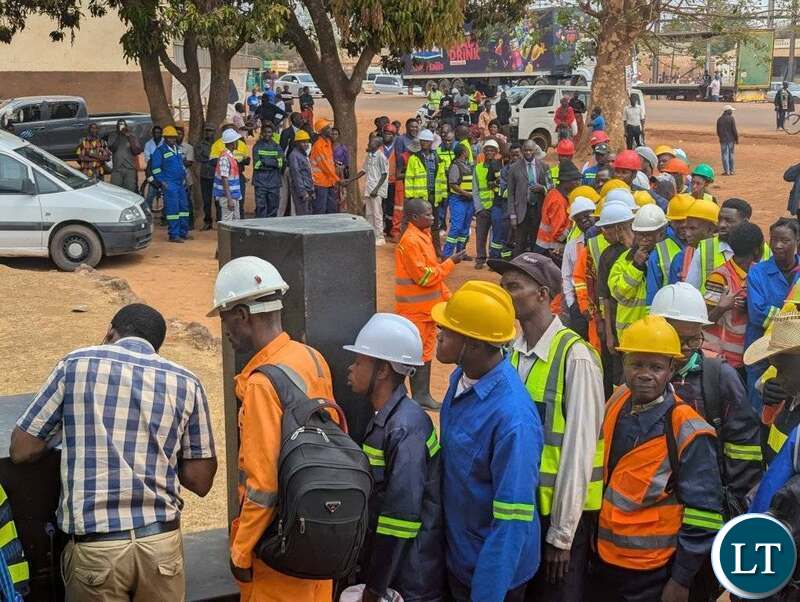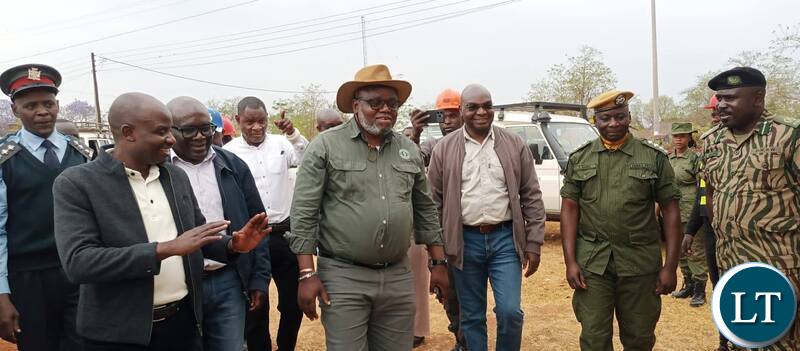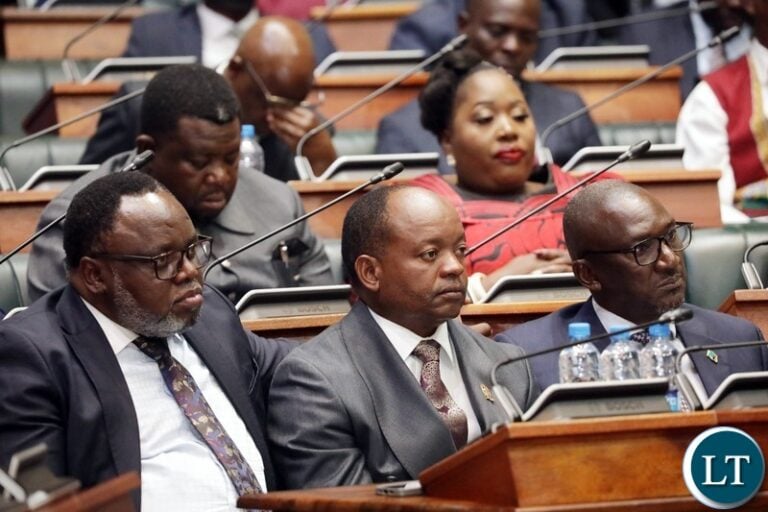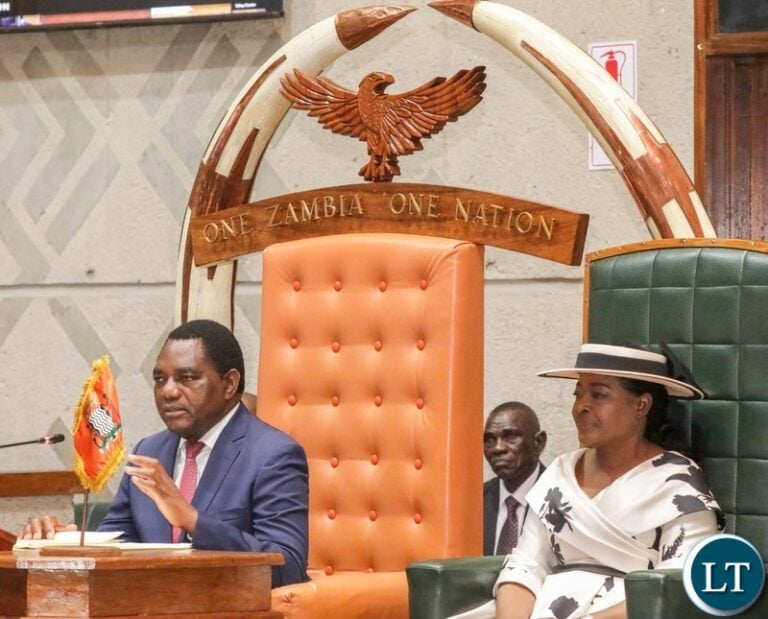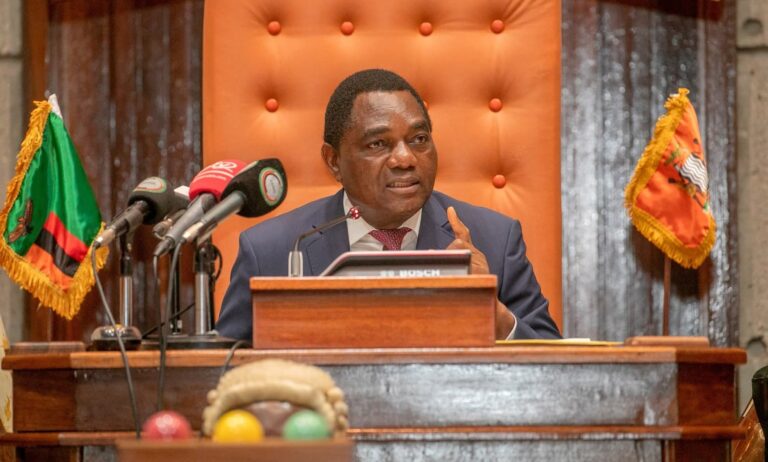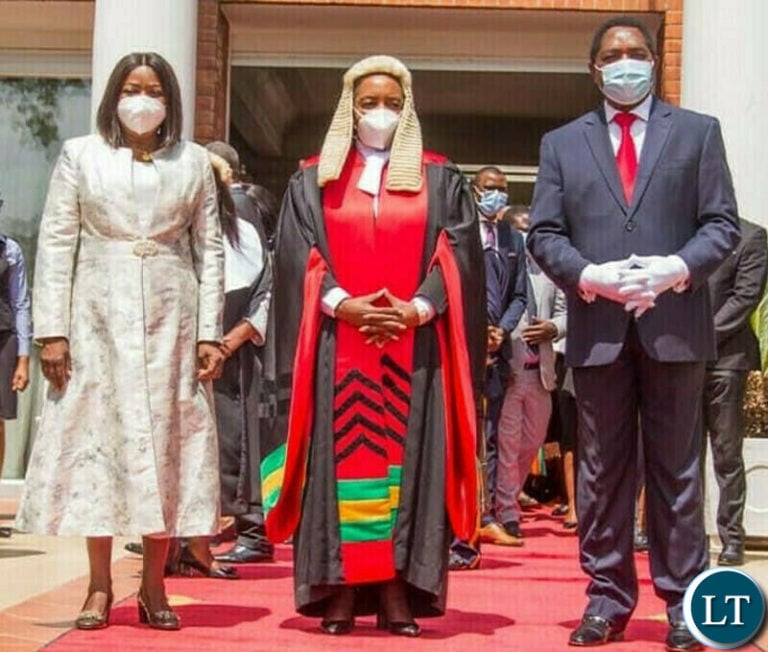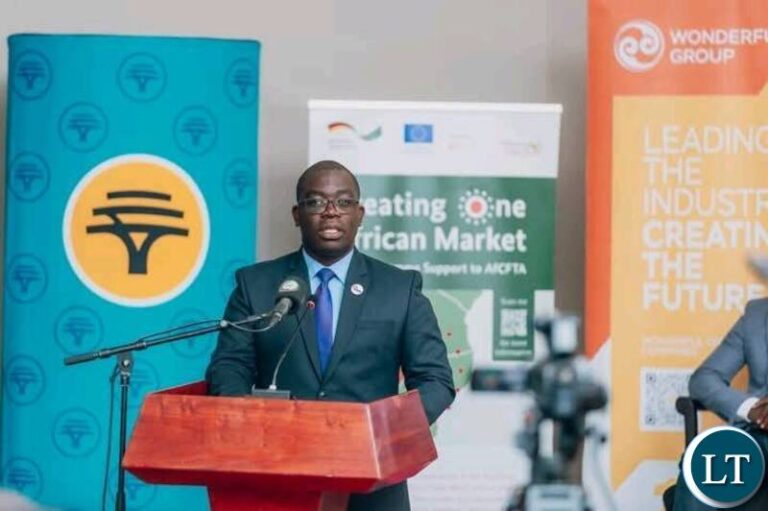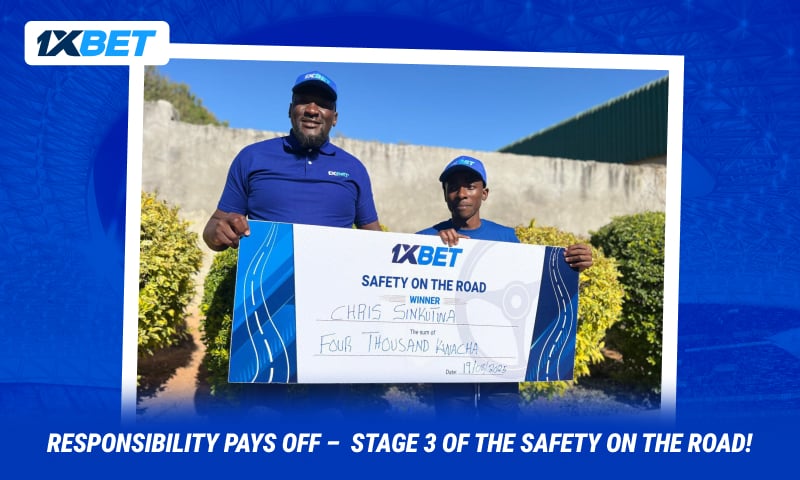BY
MR. HAKAINDE HICHILEMA
PRESIDENT OF THE REPUBLIC OF ZAMBIA
DURING THE OFFICIAL OPENING OF THE FIFTH SESSION OF THE THIRTEENTH NATIONAL ASSEMBLY
ON FRIDAY, 12TH SEPTEMBER, 2025
Madam Speaker, Introduction
We are honoured to join you today to address the house on this auspicious occasion marking the commencement of the Fifth Session of the Thirteenth National Assembly.
Before we commence, we would like to honour our late Sixth President, His Excellency Dr. Edgar Chagwa Lungu, who died in Pretoria, South Africa on 5th June, 2025. In this moment of mourning, we stand in solidarity with his family, and the country, offering them our deepest prayers and heartfelt condolences.
His service to our country will forever remain a part of Zambia’s history. May his memory inspire us to uphold the unity and dignity of our great nation.
May we be upstanding for a moment of silence.
May his soul rest in eternal peace.
Madam Speaker,
Today, we reflect on the progress we have made, the challenges that remain, and our shared national future. We thank the people of Zambia for supporting the UPND new dawn administration during this journey of economic and social transformation of our country. We are moving forward together.
Since our last address to this august house in March this year, two new Honourable members have joined the House. We extend our congratulations to Honourable Lufeyo Ngoma for Lumezi constituency and Honourable Malama Mufunelo for Mfuwe constituency. We urge the Honourable members to represent their respective constituencies with commitment and diligence.
As we welcome these members, we also mourn the loss of the clerk of the national assembly, Mr. Roy Ngulube, who died on 7th April, 2025. We honour his service to the assembly and the country at large.
Madam Speaker,
During the last session, the House considered 398 questions, adopted 38 reports, passed 26 bills, considered 14 ministerial statements and debated 14 private members’ motions.
We commend you and the two Deputy Speakers for effectively presiding over the business of this august House.
We equally extend our appreciation to the Honourable Members of Parliament for their active participation in the business of the House.
Further, we convey our gratitude to the leader of government business, Her Honour the Vice-President, for ably representing the executive.
We also recognise the office of the clerk of the National Assembly, for the services rendered to the Honourable members and ensuring that the business of the House was conducted efficiently.
Madam Speaker, Theme of the Address
Over the last four years, we have made positive strides in our economic and social transformation agenda. We have restored economic growth. We have regained market confidence. We have restored the rule of law. Our efforts are certainly yielding the desired results. Certainly, more remains to be done.
The theme for this year’s address is, therefore, “consolidating economic and social gains towards a prosperous, resilient and equitable Zambia.”
Madam Speaker,
We remain firmly committed to our national mission of building a prosperous Zambia. A Zambia where business and job opportunities are available for all. A Zambia where quality education and accessible healthcare are assured for all. Indeed, a Zambia where every citizen lives a dignified life and can achieve their full potential.
Madam Speaker, Macroeconomic Developments
In August 2021, we made a pledge to the Zambian people to revive and stabilise our economy. True to our commitment, economic growth has averaged 5.2 percent between 2021 and 2024. This is more than three times higher than the average growth rate of 1.5 percent recorded during the period 2017 to 2020.
We have been able to grow the economy despite the uncertain global environment, the huge national debt and the effects of the worst drought in living memory, experienced in the 2023/2024 rain season.
Madam Speaker, the UPND new dawn administration has made positive strides in enhancing fiscal prudence and addressing the debt crisis. Today, we are happy to report that over 92 percent of our external debt has been successfully restructured.
Further, inflation has been on a downward trajectory, from an average of 23.1 percent between January to July, 2021 to an average of 15.5 percent over the same period in 2025. In the recent past, we have all witnessed the kwacha rebound against major convertible currencies. This has consequently resulted in a stabilisation in the cost of goods and services.
Madam Speaker, the Honourable Minister of Finance and National Planning will soon present the 2026 national budget to this august house. The budget will outline specific measures to consolidate the socio-economic gains towards a prosperous, resilient and equitable Zambia.
We, therefore, urge this august house to support the budget once it is presented.
Madam Speaker, Economic Transformation and Job Creation
Economic transformation and job creation is critical in fostering sustainable socio-economic development. Since 2021, our government has focused on economic reforms, diversification and value chain development in key sectors of the economy, such as agriculture, mining, tourism and manufacturing.
Madam Speaker, Agriculture
In agriculture, we have seen a rebound in the production levels across major crops. For instance, in the 2024/2025 farming season, maize production increased to a historical 3.7 million metric tonnes, compared to 1.5 million in the 2023/2024 season. Based on new information, strong indications are that our maize harvest could exceed 4 million metric tonnes for this season.
Additionally, soya beans production increased to 760,000 metric tonnes from 400,000, maize seed production increased to 94,300 metric tonnes in 2024 from 52,000 in 2023.
We are also pleased to report that our country is now self-sufficient in maize seed production. We are exporting our locally produced maize seed to a number of countries in Africa and Europe.
Madam Speaker, additional investment in maize seed production has continued. Further, with the completion of the Bayer Itaba seed production facility in Kabwe, Zambia is now the largest maize seed producer in sub-Saharan Africa.
Key drivers of growth in agriculture production include increased private sector participation and government reforms such as FISP e-voucher. We successfully delivered a major reform under FISP, migrating 730 thousand farmers onto the e-voucher.
By migrating these farmers, we were able to remove over 210 thousand fraudulent beneficiaries. This subsequently created space for genuine farmers to benefit from this critical support. This bold reform has restored integrity to the programme and guaranteed that assistance reaches the rightful beneficiaries.
Of the farmers that migrated to the e-voucher, 99% received their inputs ahead of the rains. In addition, a broader choice of inputs is being made available to them. The success of the e-voucher last season is the reason we are committed to a 100% roll-out to all our 116 districts from the 74 that were initially on the programme.
We also wish to recognise the major role played by the private sector in delivering tangible benefits in the agriculture sector. This includes the creation of more than 5,000 jobs across the agro-sector supply chain, resulting in the transformation of lives and stimulation of rural economies across Zambia.
Madam Speaker, many of our people live along and around water courses such as rivers, streams and wetlands, and yet, they are often severely affected by the effects of drought. This must not be allowed to continue. Therefore, to ameliorate the effects of climate change and improve resilience, our government is supporting the development of irrigation agriculture.
Currently, 200 thousand hectares of irrigated land is being utilised to grow maize and other crops. We are aggressively working on increasing the land under irrigation to more than 500 thousand hectares by 2027. To support our irrigation agenda, we are carrying out a number of interventions. These include water harvesting, the rehabilitation and construction of dams, as well as canals, all across the country.
Our farmers remain very determined and have achieved high production despite using modest and simple tools. We believe with increased support on mechanisation, technology, and management we can significantly increase their production and yields per hectare.
Thus, in 2023, we launched the Sustainable Agriculture Financing Facility (SAFF) to provide affordable financing for mechanisation, technology and irrigation to our small and emerging farmers.
A total of 9,000 farmers received loans from the SAFF facility in the 2024/2025 farming season, compared to 4,300 in the previous season. Financial disbursements more than doubled, increasing from K272.3 million in the previous season to K667.3 million in the 2024/2025 farming season.
Through SAFF, our farmers have been able to acquire agricultural equipment and other inputs to improve their production and productivity.
Madam Speaker, to modernise agriculture, our government has for the first time, established 40 mechanisation service centres in 2024. These centres are providing agricultural machinery and equipment for hire by small-scale farmers. So far, more than 2,500 farmers have accessed mechanisation services ranging from ploughing, planting, spraying and harvesting.
To complement this effort, 10 mechanisation centres of excellence have been established to provide capacity building to agricultural staff, mechanisation service providers and farmers. Last year, more than 210 farmers received training from the mechanisation centres of excellence.
The government will continue to establish more mechanisation service centres all across the country to take these services closer to our people.
Madam Speaker, the country is close to achieving self-sufficiency in fertiliser production. We are already a net exporter of compound D fertiliser. The ammonia and urea plant at United Capital Fertiliser Zambia Limited is now operational.
Zambia is, therefore, also poised to become a net exporter of ammonia and urea, creating rewarding jobs for our people. The plant will produce 180 thousand metric tonnes of ammonia and 300 thousand metric tonnes of urea annually.
Additionally, from a total investment of close to US$7 million, Nitrogen Chemicals of Zambia (NCZ) will have the capacity to produce 144 thousand metric tonnes of granulated compound D fertiliser and 288 thousand metric tonnes of blended fertilisers.
Madam Speaker, we wish to thank our gallant farmers and ordinary citizens for heeding to our call to produce. You showed resilience in the face of a devastating drought in the last farming season.
We equally thank our traditional leaders for answering the call to actively engage in agriculture. This is true leadership.
We also salute our defence and security wings for playing their part in enhancing food security and fighting hunger in peace times. Indeed, food security is national security.
Working together, we have delivered the greatest harvest in our nation’s history. This is a testament to the drive and talent of our people.
Madam Speaker, Livestock
Our country is uniquely positioned to derive significant economic benefit from our livestock. The sector can be one of our key exports. That is why we have set a target of US$1 billion in beef export revenues. To support this push our government has intensified disease surveillance, prevention and control measures across the country.
Our vaccination coverage against major livestock diseases, such as Contagious Bovine Pleuro Pneumonia (CBPP) and Foot and Mouth Disease, is now close to 90 percent.
To boost the vaccination drive, we have continued with local production of critical vaccines. These include vaccines against Anthrax, Black Quarter, Newcastle and East Coast Fever. We are pleased to report that we have exceeded our vaccination target for anthrax.
We have also commenced the construction of the animal viral vaccine plant in Chilanga district.
Our government has intensified efforts to establish disease free zones and increase exports of beef and other animal products. In the initial phase, we are establishing four beef compartments in Eastern, Central and Southern provinces. Over time, this programme will be expanded to other regions.
Madam Speaker, Fisheries
The fisheries sub-sector equally continues to register positive growth. Fish production increased from both farmed and natural sources, increasing from 178 thousand metric tonnes in 2023 to 197 thousand metric tonnes in 2024.
Our government will continue to invest in livestock and fisheries to increase production and exports, as well as enhance job creation and food security.
Madam Speaker, Mining
Since assuming office in 2021, we have made significant progress in creating a conducive policy and operating environment for the mining sector. This has directly led to significantly more investment going into our mines. We have largely resolved the impasse at Konkola Copper Mines (KCM) and Mopani, which had negatively impacted our copper production. We have unlocked new mining projects and also revived mines which were dormant for decades.
In line with our production target of 3 million metric tonnes of copper per annum by 2031, production has been restored to an upward trajectory. Our annual production increased from a low of 733 thousand metric tonnes in 2021, to 821 thousand metric tonnes in 2024.
We are aggressively moving towards our target of a record breaking 1 million metric tonnes of copper production by the end of 2025. This will happen for the first time in Zambia’s mining history.
Madam Speaker, our first major intervention in the mining sector in 2021 was a resolution of disputes between the government of the republic of Zambia and First Quantum Minerals (FQM). This resolution led to FQM’s restored confidence in Zambia and their subsequent decision in February 2022 to invest US$1.25 billion, to expand Kansanshi mine at Sentinel Three otherwise known as S3.
Without this expansion, Kansanshi mine was scheduled to close by 2024. The additional investment has extended the life of the mine by 25 years.
Since the decision in 2022, expansion works have progressed well and we are pleased to have officiated at the commissioning of the S3 project in August this year. As a result, annual copper production at the FQM mines is expected to increase to 500 thousand metric tonnes per annum.
Madam Speaker, Mopani Copper Mine is a crucial economic pillar on the Copperbelt. Its production had fallen and the mine was on the verge of closure in 2023. Our government took a decision to on-board a strategic equity partner who would provide both capital and supplemental expertise.
International Resource Holdings (IRH) emerged as the best choice and we, through ZCCM-IH, entered into a joint venture that unlocked US$1.1 billion of capital into Mopani.
This investment revamped mining operations at Mopani and production has grown by 40 percent with a target of 230 thousand metric tonnes of copper per annum at peak before further expansion. More than 2,000 Zambians have been employed and local suppliers have been engaged and continue to benefit from the mine’s growth.
Madam Speaker, Konkola Copper Mines (KCM) was recklessly placed in liquidation occasioning great liability to the treasury. It was necessary to correct this expropriation from an investor who was seen to have lost public trust. Our government took the decision to re-engage Vedanta to ensure that KCM returns to production as this would not have been possible while the matter remained in court.
We have always emphasised that we should not mine nor do business in court.
KCM has paid off a large number of creditors through a scheme of arrangements and is steadily developing its production in addition to corporate social responsibility initiatives.
Madam Speaker, in October last year, we commissioned works on the US$2 billion Barrick Lumwana Mine Super Pit Expansion Project. The project is scheduled to be operational in 2028 and will add 240 thousand metric tonnes of copper per annum.
Our commitment to increasing copper production is further attested by our drive to revive some dormant mines. In November last year, we commissioned the re-opening of Kalengwa mine in Mufumbwe district. The mine had been closed for nearly 47 years.
The Luanshya Copper Mine’s 28 Shaft had been dormant for nearly 24 years until 2024 when we commissioned the dewatering of the shaft. This process is expected to be concluded by end of 2025, two months ahead of schedule. Once completed, this will enable Luanshya Copper Mine to reach its production target of 100 thousand metric tonnes. The revival of 28 shaft will also create 3,000 new jobs for our citizens.
Non-Ferrous China-Africa (NFCA) Mine is expected to expand with a US$500 million investment. Additionally, the entry of a new investor at Lubambe copper mine is adding to our production levels with a US$340 million investment and saving 1,500 jobs that would have been lost without this re-investment.
Besides rejuvenating and expanding old mines, we have planted the seed for new mines. These include the highly anticipated Mingomba mine in Chililabombwe, and the Kitumba mine in Mumbwa which are both in the mine development stage, along with other mines that will be announced in 2026.
Madam Speaker, the high-resolution aerial geophysical survey, which commenced in July last year, is on course. So far, around 30 percent of the country has been surveyed.
The survey is important in identifying mineral deposits, attracting investment, supporting exploration, improving mineral resources management and adding revenue to the country.
To curb illegal mining, our government is formalising artisanal and small-scale mining. To this end, we issued over 1,400 artisanal and small-scale mining licences to date. The highest number of licences issued is for gold mining, accounting for 71 percent.
We urge all our artisanal, small, medium and large-scale miners to strictly adhere to legal and regulatory frameworks, safety standards, formal trade and security.
We recognise that mining is an environmentally sensitive operation. Our government remains committed to clean and eco-friendly sustainable practices in our endeavour to develop the mining industry. As such, we will strengthen environmental compliance enforcement and hold accountable those who violate our environmental protection laws.
Madam Speaker, Tourism
Over the past four years, we have made strategic investments in tourism infrastructure, marketing, product diversification, policy reforms and community engagement. We have laid a solid foundation for a more resilient, diverse and economically impactful sector.
Madam Speaker, our interventions in the tourism sector are yielding positive results. We have continued to record an increase in international tourist arrivals and revenues. Tourist arrivals increased from 554 thousand in 2021, to a record 2.2 million in 2024, the largest in Zambia’s history.
This continued increase in international arrivals is largely attributed to a number of measures including the visa waiver policy to 167 countries, as well as intensified marketing and hosting of international meetings and conferences. More investment in hotels and other hospitality infrastructure is in progress in collaboration with the private sector.
The launch of the “Destination Zambia” campaign has contributed to raising the country’s international profile, while the “take a holiday Yamu Loko” campaign has stimulated local tourism. The first half of this year saw an increase in the number of domestic tourists to more than 240 thousand from 129 thousand recorded in the same period last year, representing an increase of 92 percent.
We have embarked on the rehabilitation of access roads leading to major tourist destinations, including roads to South Luangwa, Kafue and Lower Zambezi national parks. There is an aggressive campaign to promote more international flights into Zambia overall, as well as Lusaka and our tourism capital Livingstone, in particular.
We have also continued to support and promote traditional ceremonies, as well as cultural festivals, to preserve our cultural heritage and attract more tourists. We encourage royal highnesses to attend each other’s ceremonies to promote cultural cohesion and national unity.
Going forward, in the year 2026, we will be commissioning many work streams under the US$100 million Green Resilient and Transformational Development Project (Great-TDP). This will accelerate tourism growth and benefit the economy.
Additionally, we take note of the human-wildlife conflict that exists in some of our communities. This informs us of the need to sensitise our people on the need to coexist with wildlife and create buffer zones.
Madam Speaker, Energy
Our fellow citizens, energy is critical to industrialisation and national development. The current hardships in the power sector have severely affected the livelihoods of our citizens. Small businesses are suffering and incomes are being eroded.
We feel the pain and frustration of power outages faced by our citizens which include our families, friends and loved ones. No one has been spared.
In the 57 years prior to 2021, growth in demand for power consumption significantly outstripped investment in power generation, transformation and distribution. For too long, this issue did not receive the needed attention. Our government is actively addressing this challenge.
We strongly recognise that the growth of our economy implies increased demand for electricity and this presents an opportunity for us to increase our generating capacity. Our commitment is to deliver new generation capacity through sweeping policy reforms and implement cost reflective tariffs to drive more investment. We are undertaking development in transmission infrastructure as well as promoting off-grid power solutions in rural areas beyond the reach of the national grid.
We have further liberalised the energy sector with an open access regime which allows access to the grid by any willing developer to any willing off-taker as well as the introduction of private power trading, net metering, tariff blending and interconnectors with neighbouring countries, amongst others. This has created an alternative off-take avenue for developers, in addition to the traditional Zesco off-take.
Madam Speaker, our over dependence on hydro-electric power which currently stands at 85 percent of our energy mix has exposed our vulnerability to climate change. We are diversifying the energy mix to make the sub-sector resilient to climate change and increase our generation capacity. Notable interventions include the 94 megawatts Copperbelt energy corporation Itimpi solar power station and the 100 megawatts Chisamba solar phase-1 project, which we recently commissioned.
Works on the 136 megawatts Copperbelt Energy Corporation (CEC) Itimpi Solar Power Station phase-2 are on-going, while phase-2 of the 100 megawatts Chisamba Solar Project will be commencing soon. Last year, we launched the construction of the 300 megawatts Maamba thermal power plant phase-2 expansion project which is targeted for completion mid next year.
In order to ensure energy sufficiency and surplus, our focus is to develop solar and thermal capacity which are not vulnerable to the impact of climate change. The new solar projects that will be commissioned over the next 12 months will generate a confirmed total of 740 megawatts. These solar projects are located across seven provinces which include: Luapula, Central, Southern, Western, Northern, Eastern and Muchinga where the levels of solar energy are most suitable.
There are numerous private sector driven projects that are currently in development that will take our new solar power generation capacity beyond our target of 1,000 megawatts, over the next 12 months. Early this year we signed our country compact under the Mission-300 initiative in Tanzania, along with 29 African heads of state. This compact underscores our government’s commitment to deliver 10 gigawatts by 2030.
This is Zambia’s contribution towards ensuring that 300 million Africans, including 3.2 million of our unserved Zambians, gain access to electricity. We are on course to achieving this target based on the pipeline of projects in progress and more that are earmarked to come on stream in the medium-term. Our overarching long-term ambition is to achieve universal access to electricity for all our citizens.
Madam Speaker, Science and Technology
Technology, science and innovation are engines of economic transformation. To this end, we are investing in information and communication technology infrastructure, whilst enhancing digital literacy, promoting innovation-driven entrepreneurship and investing in research and skills development.
Over the past four years, our ICT sector has experienced remarkable growth. Last year, the sector grew by 17.4 percent, increasing the sector’s contribution to overall GDP growth.
Mobile phone penetration now stands at 71.8 percent, compared to 63.3 percent in 2021. Internet subscriptions reached 13.5 million people, compared to 10.4 million in 2021.
In 2024, mobile money transactions reached an unprecedented K486 billion, with 12.9 million active accounts. These are not just numbers, they reflect deeper access to information, services, jobs, economic opportunities and civic participation.
This is a clear demonstration that digital trust and financial inclusion are taking root in the country.
Madam Speaker, Trade and Investment
Your government is working tirelessly to stimulate trade, attract more investment and empower local entrepreneurs. This is positioning our country as a competitive participant in both regional and global markets.
We have attracted more investments in mining, agriculture, renewable energy, digital technology, among others. These investments are translating into economic growth, business opportunities, treasury income, and more jobs for our people, especially the youth.
In 2021, our non-traditional exports were US$2.6 billion. Currently, they stand at US$3.6 billion. More of our honey, maize seed, beef, cotton, tobacco, sugar, cement and other products are being exported within Africa and beyond.
A clear demonstration of our groundbreaking strides and phenomenal economic turn around, is the performance of the Lusaka Securities Exchange – all share index.
Recently the Luse has posted a remarkable 55.8 percent growth, on year to date. This is a mark of investor confidence, backed by real fundamentals. Our methodical approach is working and the numbers are speaking louder than ever before. More importantly, we are working on reforms that will allow for more innovation and participation of ordinary Zambians in the capital market.
Madam Speaker, we have made significant progress in accelerating the development of special economic zones across the country. By the end of 2024, the zones had attracted 87 companies that were fully operational, with an investment outlay of US$2.9 billion. Over 48 thousand jobs have been created. In addition, 47 companies were at construction stage in the various special economic zones.
Additional special economic zones, will include the beef special economic zone along the Kafue flats; Agro special economic zone covering Mpongwe, Masaiti, Kafulafuta and Ngabwe; the fintech multifacility zone in Chongwe; the Golden Baobab multifacility economic zone in Kafue district; and the wonderful group industrial park in Chilanga district.
We intend to increase economic activities across all provinces to ensure that we stimulate provincial economies and optimise provincial contribution to the national GDP.
Madam Speaker, Micro, Small and Medium Enterprises
The UPND new dawn government has placed micro, small and medium enterprises at the very heart of our economic transformation agenda. MSMEs are the backbone of job creation, innovation, and inclusive growth.
In 2021, the Citizens Economic Empowerment Commission (CEEC) was receiving a paltry K40 million per year. Under our leadership, the allocation has increased to K1.5 billion per year dedicated to empowering Zambians.
Madam Speaker, despite this remarkable improvement in fund allocation, we face challenges as loan repayments remain low. This is threatening the sustainability of the scheme.
We have therefore rolled out nationwide capacity-building programmes in all ten provinces to strengthen management, accountability, financial literacy and the need to pay back loans. This is to ensure that MSMEs grow into viable, lasting enterprises.
Madam Speaker, Labour and Industrial Relations
We commend the labour movement and our hardworking public and private sector workers, for the spirit of harmony and collaboration they continue to show in their relations with employers.
Madam Speaker, through our open-door policy and the practice of constant dialogue, we have not witnessed industrial unrest. Instead, we have built bridges of trust and partnership. This is a testament to the maturity of our labour movement, which has chosen the path of dialogue over dispute, and resolution over confrontation.
We also commend our students in schools, colleges and universities for embracing dialogue as the most civilised way of resolving challenges.
Madam Speaker, industrial peace is not only a sign of unity between government and workers; it is also the bedrock upon which our economy must grow. Let us therefore continue to nurture this spirit of cooperation, so that together, as one people, we will build a stronger and more prosperous Zambia.
Madam Speaker, Transport and Infrastructure
The UPND new dawn administration has continued to develop transport infrastructure throughout the country. We are utilising both public and private financing, especially through Public Private Partnerships (PPPs).
To this end, the Chingola-Kasumbalesa road has been completed. The Luanshya-Fisenge-Masangano road has been completed. The all-concrete Kitwe’s-Chibuluma road has also been completed.
In addition, works on Ndola-Sakania road, Ndola-Mufulira-Mokambo road and the Lusaka-Ndola dual carriageway have advanced and are progressing well.
Madam Speaker, works on the Great North Road, from Chinsali to Nakonde, are also progressing well, with some of the sections on the road having reached 99 percent completion.
The upgrading of the Monze-Niko road to bituminous standard will be completed by November this year. In the case of the upgrading of the Chipata-Chadiza road, significant progress has been registered, and works are expected to be completed by June, 2026.
Madam Speaker, we are also improving rural road connectivity across the country. Since 2021, we have rehabilitated 2,450 kilometres of rural roads. In addition, local authorities have worked on 860 kilometres of feeder roads through the enhanced Constituency Development Fund (CDF). The creation of local capacity at district levels is delivering new roads and maintaining existing ones.
Madam Speaker, the UPND new dawn administration prioritised the rehabilitation, upgrading and construction of provincial and strategic airports. We have rehabilitated Kasama, Chipata, Mongu and Solwezi airports. Currently, we are upgrading Mansa airport and Mfuwe International Airport.
Further, we have identified land for the construction of new airports in Choma, Chinsali and Nakonde.
We are determined to transform our provincial airports to international standards and become the logistics hub of choice in the region, alongside creating more jobs and business opportunities, in and around, these airports.
Madam Speaker, the railway system is key to enhancing our competitiveness in regional transport gateways, such as the Lobito, Nacala and Beira, North-South corridors.
Negotiations for the concession agreement on the revitalisation of TAZARA have been concluded. Our aim is to rehabilitate the railway line, acquire new cargo and passenger trains, as well as improve operational efficiency. This will create more business opportunities and jobs for our people, and most importantly, decongest our roads.
Madam Speaker, another major reform in our transport sector is the introduction of the single license disk for motorists. All Zambians with a car have experienced the frustration of having to queue for multiple disks. This practical change will make the process much smoother for many Zambians as well as reducing corruption.
In addition, this government is working to implement digital payment solutions for non-impoundable traffic offences which will make life even easier for our motorists.
Madam Speaker, Land Administration
Land is the foundation of our economy and a critical asset for achieving national development, food security, social equity, peace and economic growth. As a nation, we must ensure that every Zambian, regardless of gender, age, ability, or social status, has the opportunity to own and productively use land.
We are introducing land access windows, tailored for small-scale farmers, entrepreneurs, cooperatives, and investors to ensure equitable distribution and use of land across sectors.
Madam Speaker, in order to eliminate inefficiencies, human interference, and corruption in our land administration, we are rolling out a comprehensive digitisation programme that includes mapping all land parcels.
Madam Speaker, to address the persistent delays and financial burden associated with land disputes, we will significantly strengthen the lands tribunal by increasing budgetary support, and decentralising its operations.
Madam Speaker, every resettled family, every farmer, and every investor deserves the security of a land title. We aim to systematically issue titles in all resettlement areas and designated farm blocks.
Land titles will assure security of tenure, unlock access to credit, stimulate rural enterprise and empower families to pass down wealth across generations.
Madam Speaker, our traditional leaders are the custodians of over 70% of Zambia’s land. We will work closely with them to:
-
Formalise customary land transactions
-
Train local land administrators
-
Align customary allocations with national land use plans
Madam Speaker, we have witnessed the cost when companies neglect environmental safeguards. For instance, the toxic waste disaster in the Kafue river poisoned water and affected farmland. Mining companies must never be allowed to profit while destroying the land that sustains us.
We are putting in place measures for tough enforcement and accountability, because land without protection is land at risk.
Madam Speaker, Human and Social Development
There can be no human and social development without economic growth. It is key to attaining a prosperous, resilient and equitable Zambia. That is why, since 2021, the UPND new dawn administration has been investing in education, health, water and sanitation. We have also been addressing vulnerability and inequality among our citizens.
Madam Speaker, Education
The free education policy we introduced in 2022 has given an opportunity to all our children, regardless of their socio-economic status, to attend school. Over 2.3 million learners have since returned to school, and vulnerable children have been able to progress to tertiary education level. This government has made access to universal education a reality.
To better equip our learners with the requisite skills for the job market, the UPND new dawn administration has revised the national education curriculum. We have also revised the national education policy to address barriers to accessing equitable and quality education for all.
Madam Speaker, to enhance access to quality education, we are accelerating school infrastructure development. We are constructing 166 new secondary schools across the country, which are scheduled to be completed in 2026.
Since 2022, over 2,800 additional classroom blocks have been constructed using the enhanced CDF.
In addition, 38 early childhood education hub centres are under construction and will be completed by 2026. Further, 110 early childhood education hub centres and 112 satellite centres have already been constructed.
At tertiary level, our government resumed the construction of hostels that had stalled in eight public universities. Once completed, over 8,400 additional bed spaces will be created for our students.
Construction of lecture theatres, staff houses and student hostels is on-going at the following universities: the University of Zambia, Copperbelt, Mulungushi, Chalimbana, Palabana, Mukuba, Robert Makasa, and Kwame Nkrumah.
Madam Speaker, our government has continued to ensure that no child sits on the floor in our schools. So far, 1.6 million desks have been procured, out of which over 670 thousand were financed through the enhanced CDF.
Madam Speaker, to address the teacher deficit, we have continued to increase the number of teachers in our schools. Since 2022, we have recruited 42 thousand teachers. This year, we are recruiting 2,000 more teachers.
Madam Speaker, to keep more learners healthy and improve their learning outcomes, government has continued to expand the home-grown school feeding programme. The programme has been extended to 106 districts this year, up from 70 in 2021.
The number of beneficiaries has, therefore, increased to over 4.6 million learners this year, from 1.9 million in 2021. We will expand the programme to all the 116 districts to cover over 5 million learners.
Madam Speaker, the UPND new dawn administration has prioritised skills development as a driver for economic transformation and job creation. We are encouraged by the number of youths responding to our interventions.
In 2024, student enrolment in TEVET institutions increased to 96 thousand from 38 thousand in 2021. We have also seen a marked increase in the number of female students participating in TEVET programmes to 45 thousand in 2024, from 16 thousand in 2021. This has been made possible by the bursary scheme under the enhanced CDF.
To increase access to skills training opportunities in rural areas, new trade training institutes have been constructed in Sesheke, Mporokoso and Lundazi districts.
In Lufwanyama, construction of Chapula Vocational Training Centre is underway, while the rehabilitation of Kaoma Trades Training Institute will commence before the end of this year.
We have also introduced the Zambia National Service (ZNS) voluntary skills training programme to enhance capacity for our youth. Fellow citizens, these efforts are designed to instil a sense of discipline, patriotism and accountability in our young people as they embark on the journey towards bettering the nation.
We urge more of our youths to take advantage of vocational and skills training programmes and become productive citizens. As we have always stated, education is the best equaliser, investment and inheritance.
Madam Speaker, Health
The health and well-being of our people remain at the core of our development agenda. In view of the declining global health financing landscape, our government has enhanced domestic investment in key health programmes.
These include programmes related to HIV and Aids, Tuberculosis, Malaria, Non-communicable Diseases, Primary Healthcare, Community Health, as well as medical supply chains and digital health systems.
Madam Speaker, since 2021, we have constructed 282 new health facilities across the country. These include seven level-1 hospitals, 111 mini-hospitals, 33 health centres, and 131 health posts.
Of these facilities, 164 were constructed using the CDF. Further, 206 maternity annexes were constructed and rehabilitated countrywide, using the enhanced CDF. In addition, 18 thousand health workers have been recruited. This year, government is recruiting 2,000 more health workers.
Our investments in the health sector are bearing fruit. We have indeed continued to take health services closer to our people.
Madam Speaker, government will continue to modernise and expand our health infrastructure. Your government will expedite the completion of the King Salman Bin Abdulaziz specialised hospital for women and children.
We will also expedite the completion of the rehabilitation of the Cancer Diseases Hospital in Lusaka and the construction of a Cancer Diseases Hospital in Ndola.
These facilities are expected to substantially reduce the financial and emotional burden of seeking specialised treatment abroad.
Madam Speaker, to improve our ability to detect and respond to public health threats and emergencies, we have enhanced disease surveillance at all major ports of entry and in other strategic locations.
Further, we have increased immunisation coverage for children under one year, from 75 percent in 2022, to 81 percent in 2024.
The local manufacture of vaccines such as Cholera and other medicines, as well as medical accessories, will continue to receive high priority.
Madam Speaker, availability of essential medicines and medical supplies is critical to the provision of quality health services. We are taking appropriate measures to improve the availability of essential medicines and supplies in our health facilities.
To this end, we are strengthening the management of the supply chain for medicines and medical supplies. We are reorganising the Zambia Medicines and Medical Supplies Agency (ZAMMSA) to enhance its efficiency, reliability and responsiveness. We are strengthening enforcement of laws to address systemic pilferage of drugs.
Our efforts have more than doubled the availability of medicines and medical supplies in our health facilities from 44 percent in 2021 to 85 percent currently.
We warn all those involved in the theft of medicines and medical supplies meant for our ordinary citizens, the long arm of the law will catch up with the culprits. We are currently using the results of the ZAMMSA independent forensic audit to arrest, prosecute and jail those found wanting. There are no sacred cows in fighting theft and corruption in this and other sectors.
Madam Speaker, good nutrition is a socio-economic imperative. Since taking office, we have made progress in the fight against malnutrition. Stunting in children under five decreased from 35 percent in 2018, to 32 percent in 2024.
Madam Speaker, more of our mothers are now delivering from health facilities under the care of skilled health providers. Maternal mortality has decreased.
Our government will continue to invest in the health sector, including maternity facilities at every health centre, in order to sustain this progress.
Madam Speaker, Water and Sanitation
We are happy to report that the country has made progress in the provision of clean and safe water as well as adequate sanitation for our people.
The improvements in access to clean and safe water as well as adequate sanitation services are attributed to the various interventions we have implemented. From 2021, we have constructed more than 2,000 boreholes and 491 piped water schemes as well as rehabilitated 671 boreholes, countrywide. These facilities are benefiting over 687 thousand people.
Using the enhanced CDF, we have also constructed more than 2,700 water, sanitation and hygiene facilities in public places, such as markets, schools, health centres, bus stations and communities.
Madam Speaker, we have expanded water supply and sanitation facilities across the country. Major projects completed include the Kafulafuta water supply system, the Kazungula water supply and sanitation, the Kafue bulk water supply and the Kaputa water supply and sanitation projects.
Madam Speaker, going forward, this government will continue with efforts aimed at improving availability of clean and safe water, and sanitation facilities to every citizen.
Further, we will continue to prevent and curb pollution of our water resources to protect human life and bio-diversity.
Madam Speaker, Social Protection
Government has been implementing a number of social protection programmes to reduce poverty and inequality in the country. The programmes include social cash transfer, food security pack, cash for work and women and youth empowerment.
Madam Speaker, since 2021, the UPND new dawn administration has increased the number of beneficiary households on the regular social cash transfer from 895 thousand in 2021, to 1.3 million households to date.
During the drought experienced in the 2023/2024 farming season, government introduced the Emergency Social Cash Transfer and Cash for Work programmes. In addition, we increased the number of vulnerable but viable household beneficiaries under the Food Security Pack Programme.
Further, we implemented the community sale of maize at Food Reserve Agency (FRA) depots and the sale of affordable mealie meal to our communities countrywide.
Madam Speaker, under the Emergency Social Cash Transfer, 915 thousand beneficiaries’ households were reached, bringing the total to 2.2 million people. The transfer value was K400 per month.
Under the Cash for Work programme, 2.4 million vulnerable people have benefited since its introduction in August, 2024. Cash for Work will continue with some refinements going forward.
Through the Food Security Pack Programme, our government continued to provide farming inputs, such as seed and fertiliser, to vulnerable but viable farmers. In 2024, a total of 540 thousand farmers benefited from this programme.
Madam Speaker, it is gratifying to note that no life was lost to hunger despite the severe drought the country experienced last year. This is a clear demonstration that the measures our government put in place worked. Yet again, your government delivered to protect the people.
Madam Speaker, Environmental Sustainability
Sustainable development continues to be our guiding principle in our quest for socio-economic development. We are harnessing renewable energy, promoting sustainable agriculture, protecting our biodiversity and fostering social equity.
We have enhanced the country’s early warning systems by constructing modern weather stations in all the districts and for all major water bodies.
This has improved dissemination of weather information to our communities and farmers so they can plan and make informed decisions.
Madam Speaker, government has continued to implement afforestation programmes to enhance the conservation of forests and the environment. Since 2021, a total of 10.3 million hectares of forests across the country are being sustainably co-managed with 369 community forest management groups. These groups are being supported with alternative livelihoods to reduce pressure on forest resources.
Madam Speaker, Good Governance Environment
Good governance is fundamental in consolidating our socio-economic gains. We have made progress in implementing various governance reforms aimed at promoting human rights and freedoms.
We have entrenched transparency and accountability, enhanced local participation in decision-making as well as continued to strengthen our democracy. We have continued to enhance access to justice and observance of the rule of law.
Madam Speaker, since assuming office, we have accelerated implementation of the decentralisation agenda. We have taken resources away from the centre and enhanced the allocation to CDF with over K16 billion disbursed since 2022. This is a huge number with real value delivered closer to where people reside.
Madam Speaker, we have devolved 13 functions, with matching resources, from central government to local authorities to enhance service delivery and accountability.
Madam Speaker, government continued to transform and modernise provision of public services through digitisation. We have increased the number of public services being offered online through the Zamportal to 368 in 2025 from 116 in 2021.
We have established an online citizens support services portal through which members of the public can interact with government departments on service delivery. We have also made progress in digitising government internal processes and systems to enhance efficiency and reduce incidences of corruption.
Madam Speaker, we are honouring our commitment to upholding the rule of law and constitutionalism. Arresting and prosecuting lawbreakers is not equivalent to loss of democratic space and human rights.
We have restored professionalism in our law enforcement agencies ensuring a peaceful and safe environment in public places such as markets, bus stations and other business premises.
We thank the Zambian citizens for embracing this change and upholding tenets of good citizenship. This is the peaceful atmosphere we expect from all of us as we enter the election season next year. We will not tolerate any lawlessness of whatever form before, during and after elections.
We have enhanced the capacities of the judiciary, national prosecution authority and public protector. Currently, the High Court is present in all our ten provinces.
In addition, government is now conducting mobile court sessions in correctional facilities to accelerate dispensation of justice and reduce case backlogs. However, we acknowledge that more work needs to be done.
Madam Speaker, our stance on zero tolerance to corruption and economic crimes has remained firm.
We have expedited the disposal of cases on corruption and economic crimes through establishment of the Economic and Financial Crimes Court. We have increased funding and enhanced capacities of our law enforcement agencies and oversight bodies.
Our successes are affirmed by our country’s improved corruption perception index score from 33 in 2021, to 39 in 2024. Further, our global ranking has improved to 92 from 117, out of 180 countries during the same period.
This has reversed the years of decline and stagnation experienced during the period preceding August 2021.
Madam Speaker, your government will continue to build a culture of integrity. We need a society that rewards ethical conduct. A society that values hard work. A society that frowns upon corruption.
Therefore, our commitment to fighting past, present and future corruption remains unshaken. What is not yours, is not yours. What is for the public is for the public. What belongs to the citizens is for the citizens.
We will never allow a few individuals to benefit from, and abuse, public assets at the expense of the majority.
Madam Speaker, in our effort to respect and protect human rights, government has continued to decentralise legal aid board offices to districts. Since 2021, we have opened additional offices in 15 districts. These include Mporokoso, Kawambwa, Lundazi, Kaoma, Zambezi and Lusaka established this year.
Further, we are providing mobile legal aid services in Luangwa, Chongwe, Siavonga, Chirundu, Sesheke, Kalabo and Kabompo. This is in addition to legal services units and paralegal desks at police stations, correctional facilities and courts.
These improvements in the provision of legal aid services are yielding positive results. As of June, this year, over 55 thousand people countrywide received legal assistance from the legal aid board. This is in keeping with the principle of access to justice and human rights for all, across all ten provinces of our country.
Madam Speaker, the house may recall that the access to information act was signed into law on 15th December, 2023. We are, therefore, pleased to announce to the nation that the access to information regulations have since been issued to facilitate full implementation of the access to information law.
This legislation marks a significant step towards enhancing transparency and accountability in government operations. The legislation will enhance public participation, promote good governance and combat corruption.
Madam Speaker, credible elections constitute a critical hallmark of a functioning democracy. As a country, we pride ourselves in having peaceful and credible elections with a peaceful transition from one administration to another.
In preparation for the general election in August next year, the Electoral Commission of Zambia (ECZ) will conduct a countrywide voter education and mass registration of voters.
We urge every eligible citizen to register and exercise their democratic right to vote.
Madam Speaker, Foreign Policy
Since 2021, our foreign policy has been anchored on two pillars: economic diplomacy on the one hand; and peace, security and stability on the other. We are consolidating our position as a competitive economic regional hub. We are deepening strategic partnerships and cooperation. We are expanding trade, attracting investment, boosting tourism and food security for the nation and region.
Our country will continue to play an active role in promoting peace and security in the region and beyond. We will continue to be an active player in regional, continental and international bodies.
Madam Speaker, Conclusion
In our inaugural address to this august house, on 10th September, 2021, we laid out an ambitious agenda centred on macroeconomic stabilisation and reforms for growth, robust human and social development, environmental sustainability, and a strong commitment to good governance.
We committed to restoring fiscal discipline and addressing our country’s debt burden, this was critical for broader economic recovery and growth.
Madam Speaker, this administration, the people’s administration, the UPND new dawn administration, has scored big on many fronts for the 20 million plus Zambians. Today, we have highlighted substantial progress recorded in the past four years of our administration.
Madam Speaker, the economy has been resuscitated and is back on a positive growth trajectory. Significant strides in debt restructuring have been registered. International financial credibility has been restored. An unprecedented bumper harvest has been recorded. Increased foreign direct investment, in various sectors of our economy, is being witnessed. In mining, in energy, and indeed, in agriculture.
Madam Speaker, our drive towards decentralisation has enhanced the governance system and empowered our people to participate in local economic development. The enhanced CDF has been a game changer for our communities, for the women, for the youth and for the vulnerable.
Free education has been delivered for our children. Social protection programmes have been significantly enhanced. Massive recruitment in the education, health, defence and security sectors has been implemented. Private sector jobs such as in mining are being created. Infrastructure development programmes, particularly in roads, transport and digital connectivity, have opened up economic corridors and fostered digital inclusion.
We have remained resolute in our commitment to transparency and accountability. The anti-corruption fight is yielding results. The rule of law continues to be strengthened.
As the UPND new dawn administration, when we promise, we deliver. When we deliver, we consolidate. When we consolidate, we invigorate. Together, we will overcome the challenges that remain, and together as one Zambia, one nation, this country is moving forward.
Madam Speaker, our pursuit of a better, prosperous, resilient, and equitable Zambia demands of us patriotism, peace and national unity. Let every Zambian, young and old, regardless of gender or creed, reaffirm unwavering commitment to the sacred principles of patriotism, peace and national unity.
With integrity, determination and hard work, a better Zambia is guaranteed. A Zambia that is prosperous and equitable for all. A Zambia abounding in opportunity, fairness, inclusivity and resilience in our shared future and destiny.
We have what it takes to transform and continue growing the economy. We have the integrity. We have the capacity, which we need to continuously transform into action. We have the talent and the competence. We have the trust and the support of the Zambian people which we do not take for granted.
Let us work hard together for the good of all our fellow citizens, without leaving anyone behind. The country and our people are safe in our collective hands.
Madam Speaker, it is now our honour and privilege to declare the Fifth Session of the Thirteenth National Assembly officially opened.
God bless our efforts.
God bless our people.
God bless our country, Zambia, Africa, and our collective humanity.
Madam Speaker, we thank you all in this House, and across our country, for your kind attention.


